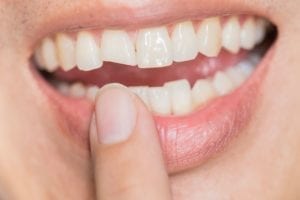With all of the changes due to the COVID-19 pandemic, the stress levels of Americans are increasing. It’s a time where there’s a lot of unknown and people are worried. You may know that stress can impact both your mental and physical health, but how exactly does it affect your oral health? Dr. Joseph A. Catanzano III, a Washington DC dentist, discusses the effects that you should be looking out for.

Grinding and/or Clenching Your Teeth
A common side effect of stress is grinding or clenching your teeth, even if this wasn’t a habit you had before. You can catch yourself doing it subconsciously throughout the day, or it may happen overnight with you not even realizing it. This may cause headaches, especially when you wake up in the morning, as well as pain in your jaw and face. Since there’s a lot of pressure on your teeth, that tension may radiate down throughout the neck and shoulders as well.
Grinding or clenching your teeth also leads to wear and tear on your smile. At the least, your teeth will wear down faster than normal. This can also lead to cracked, chipped, or broken teeth. It can be anything from a small cosmetic chip to a severe crack or break. A more severe issue can expose the tooth pulp, causing pain and the opportunity for bacteria to get inside the tooth.
If you experience a severe break or crack, call us immediately. During the pandemic, we’re still offering emergency services for patients of record. This is something that you should get treated right away.
Decreased Immune Response
One of the biggest impacts of stress is that it causes a decreased immune response. But how does that impact oral health? It makes you more susceptible to bacterial infections in the mouth, as well as gum disease.
Bacterial infections of the mouth often show up as ulcers or sores. You may notice red or white spots or lines in the mouth. These are all signs of an infection caused by stress. If this happens to you, rinse frequently with warm salt water. Use antiseptic oral gel if you have some. This can help both with any pain you have, as well as keeping your mouth clean.
If you notice bleeding gums or gums that are more tender than normal, you probably have early-stage gum disease. When there are openings where your gums are bleeding, that gives bacteria a chance to get into the bloodstream. This takes the infection throughout your body and can cause issues in other areas.
However, the inflammation from gum disease can be even worse than the infection. Your body uses resources constantly to fight the inflammation. This makes your body more susceptible to other infections or viruses since your immune system is stretched even thinner with this.
Your Dentist in Washington DC
We’ll be here after the crisis for checkups, too. Make sure that stress hasn’t done too much damage to your smile. Call us or schedule an appointment online for the future. We hope to see you soon!
